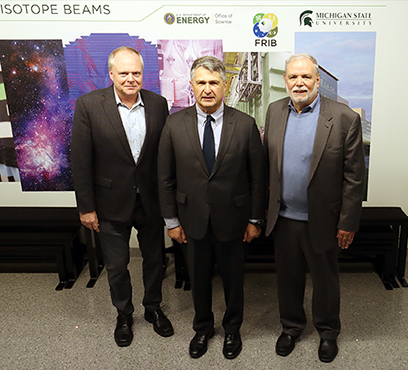Director of the Carnegie Endowment for International Peace Russia and Eurasia Program gives Distinguished Nuclear Policy Lecture at FRIB Laboratory

Share this article:
Share this article:
Dr. Eugene Rumer, former national intelligence officer for Russia and Eurasia at the U.S. National Intelligence Council and director of the Carnegie Endowment for International Peace Russia and Eurasia Program, gave a lecture titled “Russia’s Long War” on 13 November at the FRIB Laboratory. Dr. Rumer’s lecture was part of the Distinguished Nuclear Policy Lecture series. As part of his visit, FRIB Laboratory Director Thomas Glasmacher hosted Dr. Rumer on a tour of the facility and discussed FRIB’s history, progress, science, and technology along the way.
The “Russia’s Long War” abstract states: "Experts rarely predict major events, but afterwards they can explain why what happened was inevitable. Few predicted that Russia would launch an all-out war against Ukraine in February 2022, and even when intelligence leaks showed that Russia was preparing to attack, many did not believe it. Yet, in retrospect, this war was inevitable for reasons of history, geography, and personalities involved. Dr. Eugene Rumer will speak to why these drivers of Russian security policy matter so much and why this war with Ukraine and confrontation with the West will last a long time.”
Dr. Rumer is a senior fellow and the director of the Carnegie Endowment for International Peace Russia and Eurasia Program.
Prior to joining Carnegie, Dr. Rumer was the national intelligence officer for Russia and Eurasia at the U.S. National Intelligence Council from 2010 to 2014. Earlier, he held research appointments at the National Defense University, the International Institute for Strategic Studies, and the RAND Corporation, and served at the U.S. Department of State and on the National Security Council staff.
The Distinguished Nuclear Policy Lecture series is a partnership between Michigan State University’s James Madison College and FRIB that brings global policy experts to campus for talks about the political and scientific communities. This lecture series brings together experts and scholars from diverse backgrounds to discuss issues related to nuclear policy, arms control, and non-proliferation. The lectures provide insights, analysis, and perspectives on the current challenges and opportunities in the evolving field of nuclear policy.

